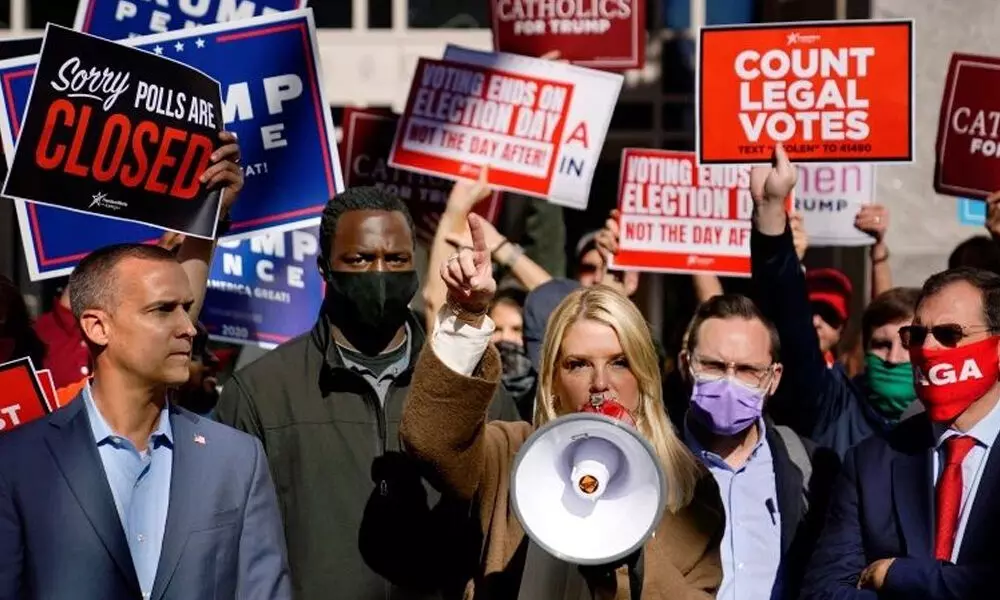Republicans' doubts over Trump loss persist?
Ballot fraud has a long history in the US During the 19th century it was endemic
image for illustrative purpose

IN Arizona, the recount of votes from last November's presidential election proceeds apace. In Texas, Georgia and elsewhere, Republican legislators continue to press "reform" legislation on the premise that the outcome was determined by fraud - a premise rejected over 50 times by State and federal courts.
But although the current level of lingering disbelief on the part of Donald Trump's supporters is unusually high, a gap between the winning and losing sides' willingness to accept the outcome of a presidential contest is nothing new. A just-released paper by MIT political scientists Jesse T Clark and Charles Stewart III drills down into data on the topic and turns up some remarkable findings about voter confidence in the wake of the 2020 election. In particular, although the gap between the two sides' belief that the contest was fair is by far the largest on record, the explanation may not be what one expects.
Ballot fraud has a long history in the US During the 19th century it was endemic. Even Abraham Lincoln's landslide re-election in 1864 was marred by plausible charges that military commanders allowed Republican soldiers to travel home to vote but kept Democratic troops in the field. Although changes in the process early in the 20th century greatly reduced the possibility of manipulating the count, in a close election many on the losing side still lean toward the view that the numbers were rigged. Lots of Republicans didn't believe the results in 1960. Lots of Democrats didn't believe the results in 2000.
Moreover, as Clark and Stewart point out in the new study, even apart from the outcome, shocks to the system of voting — a switch to new voting machines, for example — may reduce confidence that the ballots will be counted correctly. So the lingering skepticism among Trump supporters in the wake of 2020's pandemic-induced process changes isn't a surprise.
Which brings us back to the unprecedented gap between Democratic and Republican belief in fairness of the election. There are two basic ways to measure this belief: a voter's confidence that his or her own vote will be counted fairly, and a voter's confidence in the overall result. Although Clark and Stewart have much to say about the first, the second is where their findings are most sobering: "The divergence in opinions among Democrats and Republicans in 2020 compared to 2016, and even 2012, is obvious in virtually every State."
Before going on, let's be clear about what the paper measures. The authors are interested not in the absolute level of confidence of both sides but in the change of those levels after the election. Suppose that before the election, 52 per cent of voters in Party A and 48 per cent of those in Party B expect a fair result. After Party A wins, its confidence goes up to 55 per cent, an increase of 3 points. Party B's confidence drops to 45 per cent, a loss of 3 points. Because Clark and Stewart are interested on how the election result affects confidence, they measure the sum of the change — here, 6 percentage points.
In 2016, as usual, the rise in confidence of fairness among Trump supporters added to the drop among Hillary Clinton's supporters was 18.2 points — large, but hardly startling.
Now consider 2020. The post-election gap was an astonishing 48.6 points. This brings us to the startling part: "Contrary to expectations, the greater gap was not due to Trump supporters being especially non-confident, but because of the soaring confidence of Biden supporters."
Here are the numbers: Among Trump supporters, confidence in the accuracy of the count, already at a historic low, hardly budged after the election. But the 24.1 per cent pre-vote figure among Biden supporters ballooned afterward to an unheard of 72.8 per cent. The cause of the 2020 gap, in other words, is not that Republicans became unusually suspicious about the outcome; it's that Democrats became unusually certain that the numbers were right.
The authors suggest that 2020's extreme Democratic confidence was "influenced by a strong negative repudiation of Trump's calling the results of the election into question." This proposition would turn conventional wisdom inside out: Trump's unsupported pre-election claims of rigging may have depressed Republican confidence in the count's fairness, but his equally unsupported post-election insistence on ballot fraud has influenced only Democrats.
What does all this mean going forward?
That depends. If the bombastic and controversial Trump proves to be unique, one would expect the passage of time — and of an election cycle or two — to bring us back to the "normal" political world, in which the views of fairness fluctuate in the short run around a great middle, depending on who wins and who loses.
But ideological certainties can be sticky. Today's dispute over a particular election can become tomorrow's axiom. So if the attitudes Clark and Stewart measure turn out to bespeak a new normal, our fragile democracy may be headed for a peculiarly unhealthy future. (Bloomberg)

